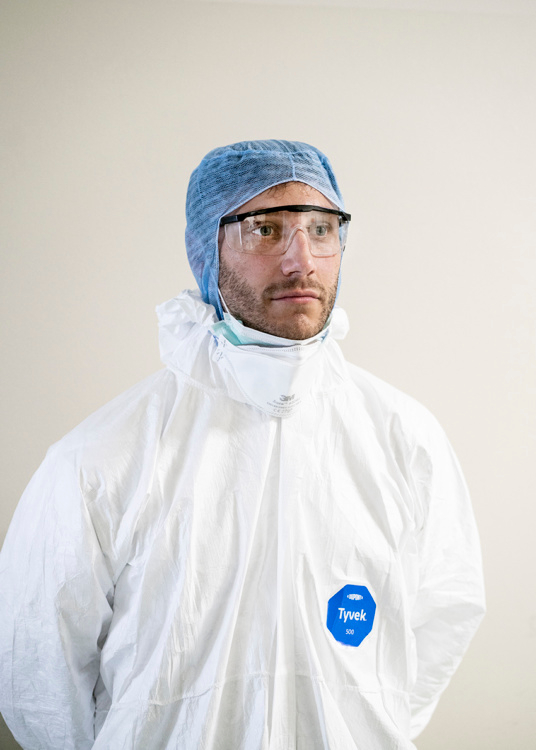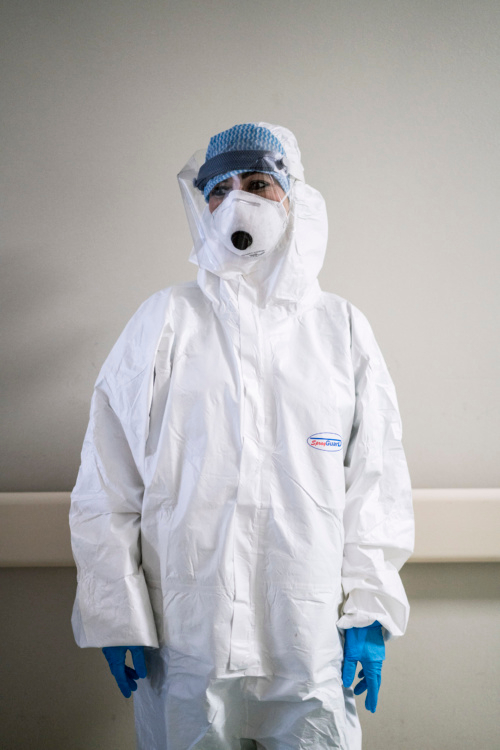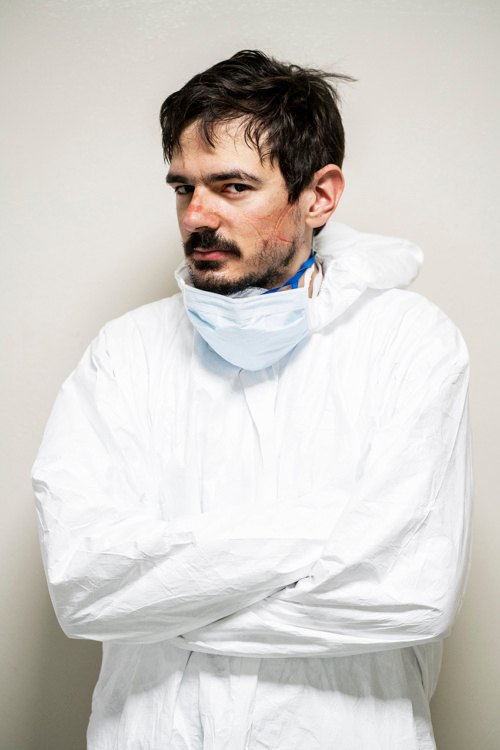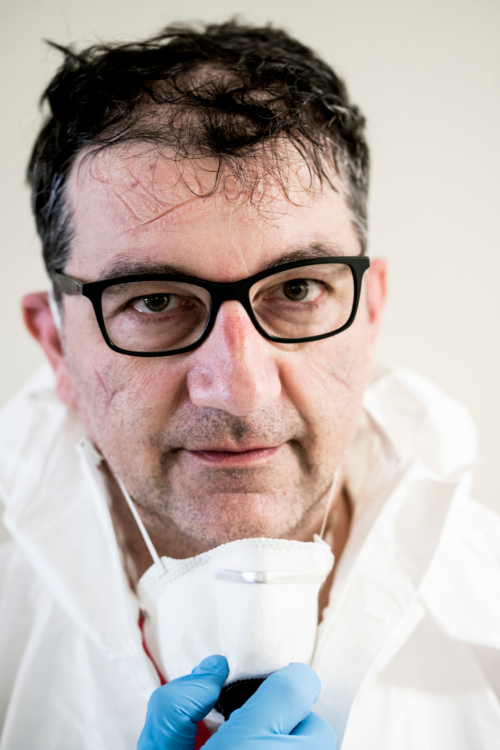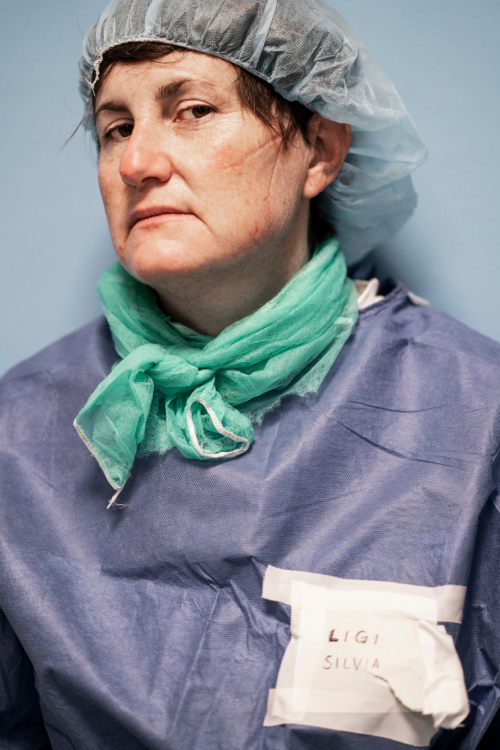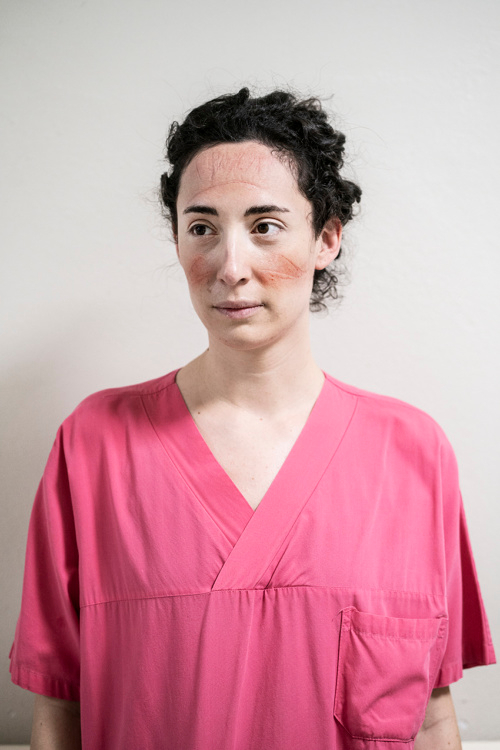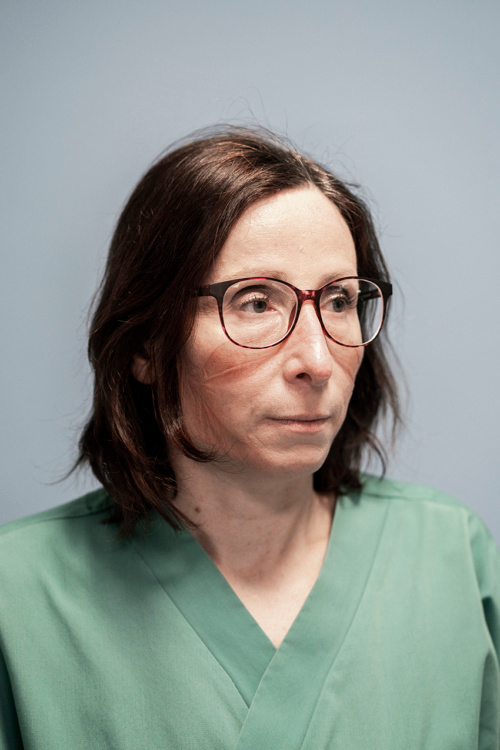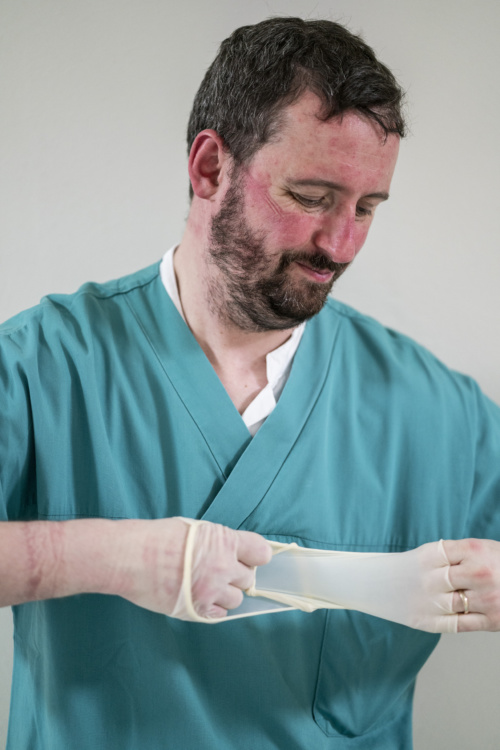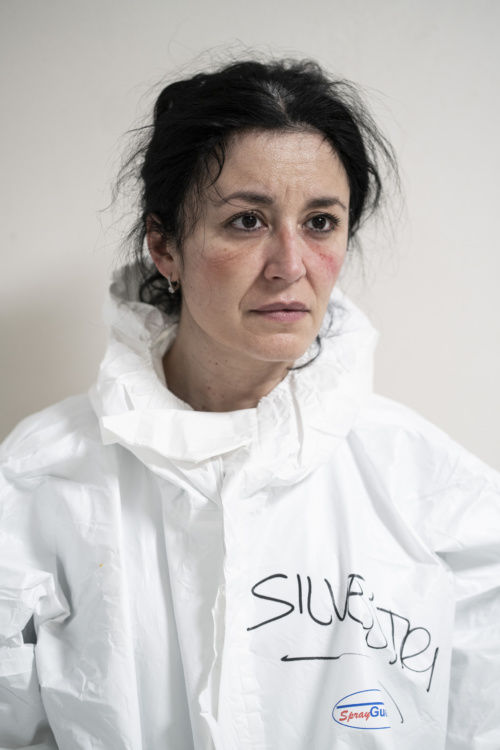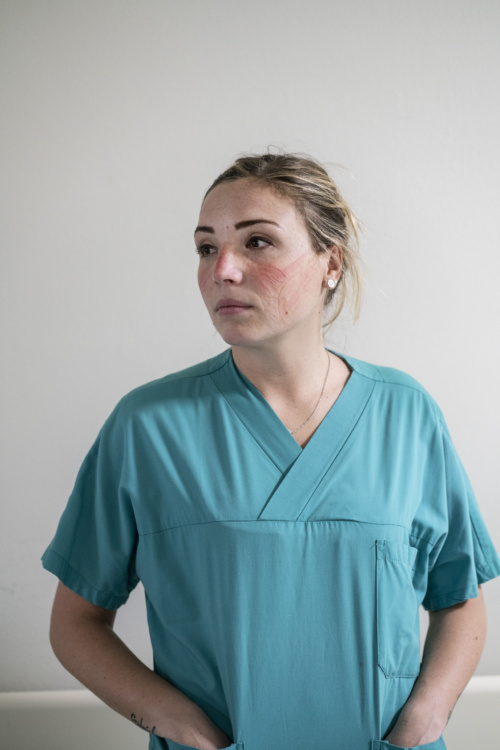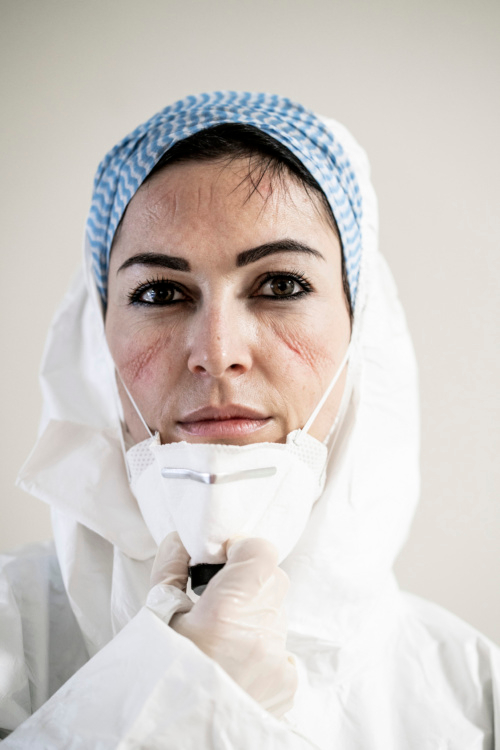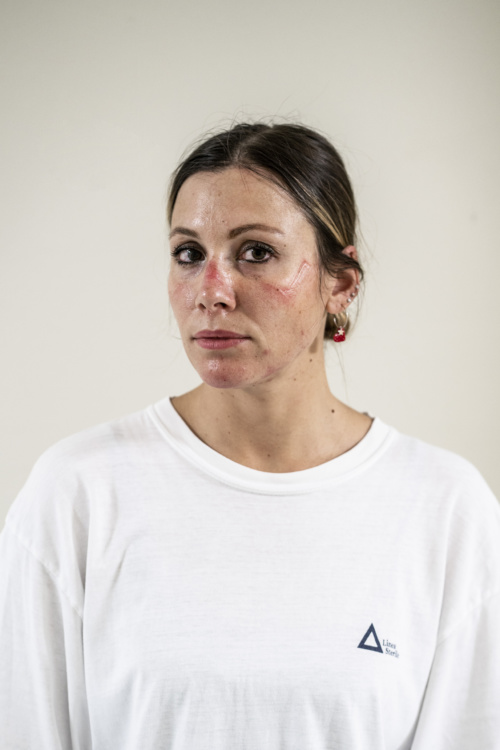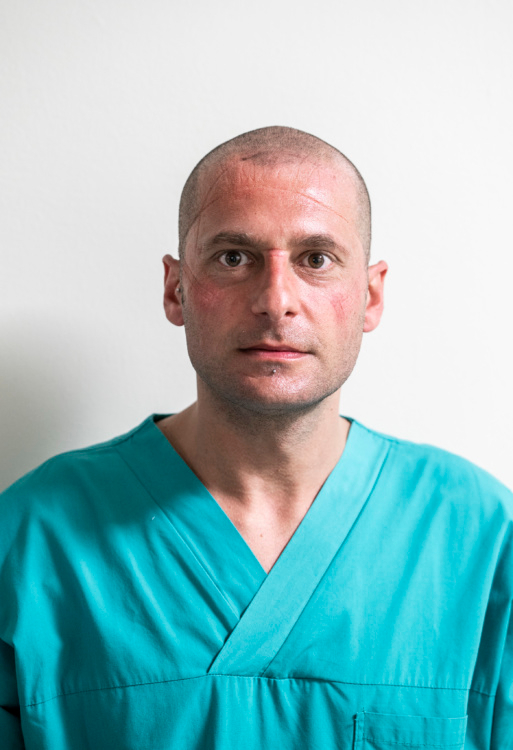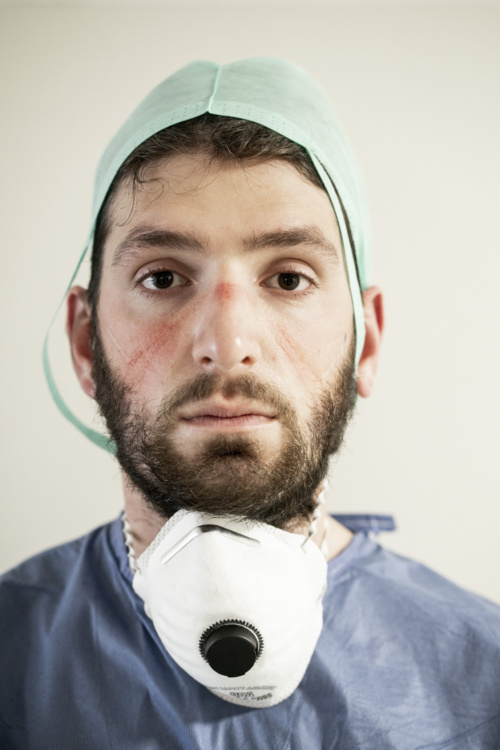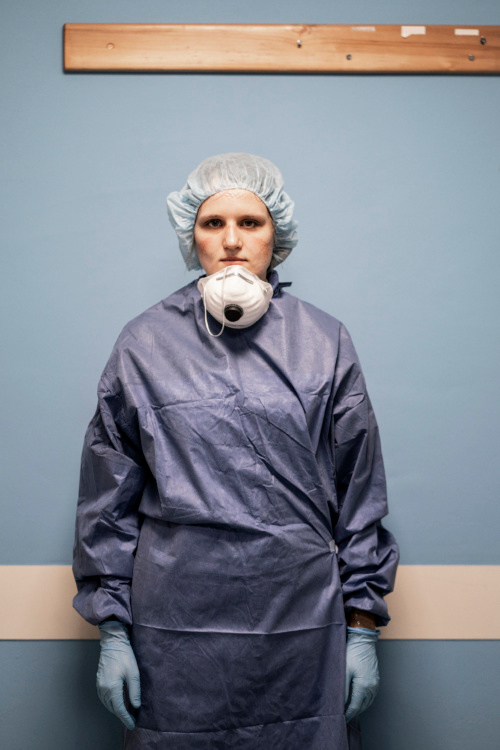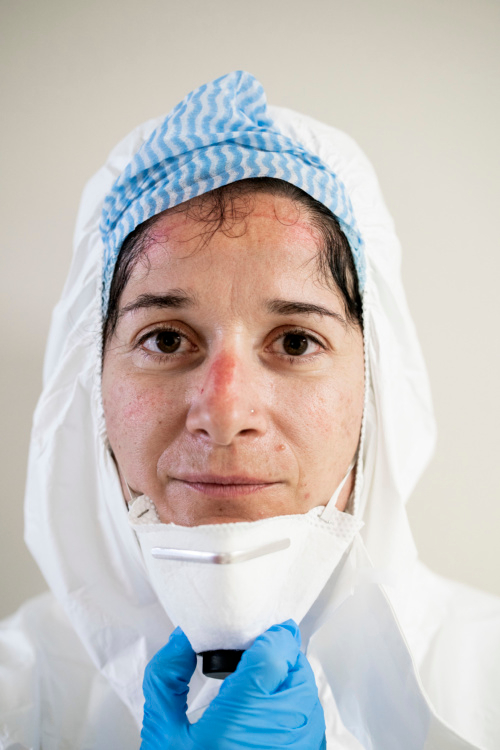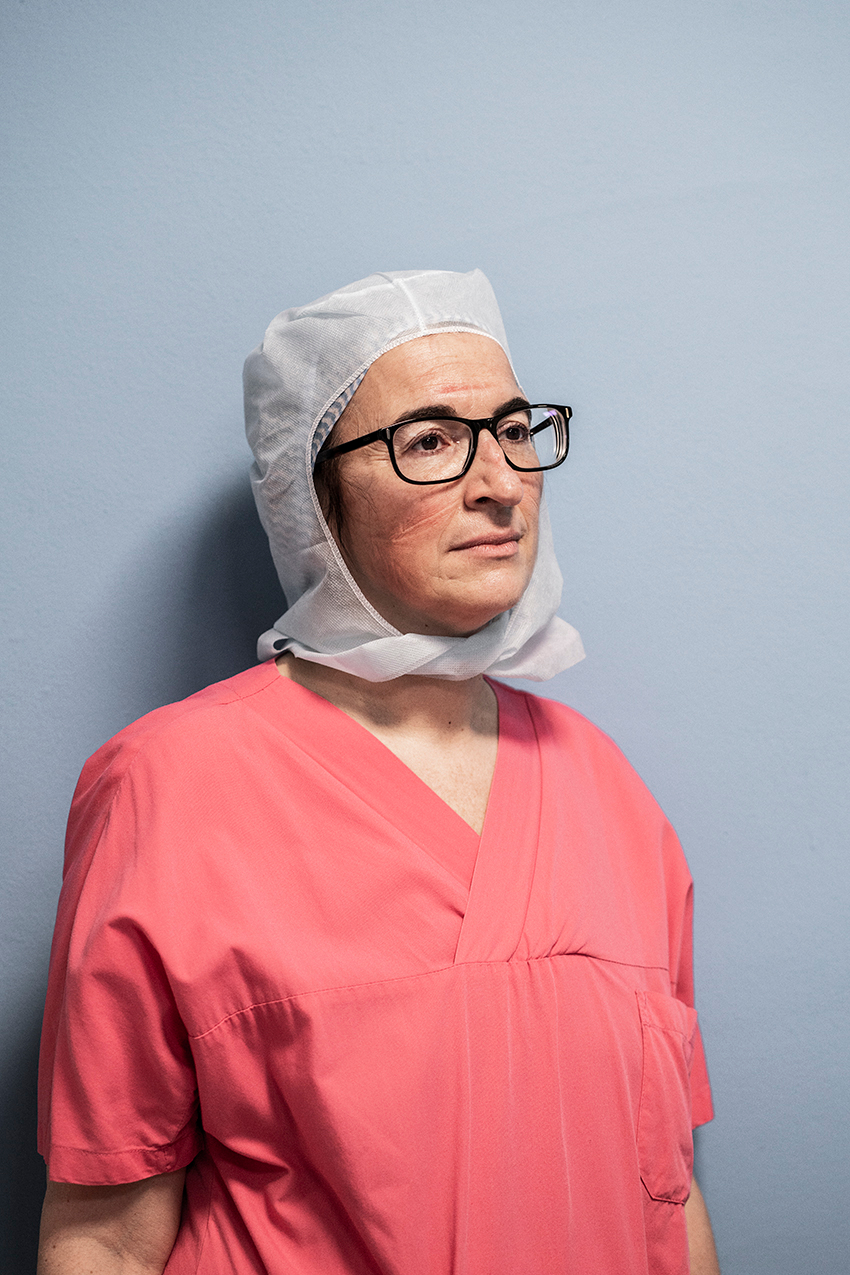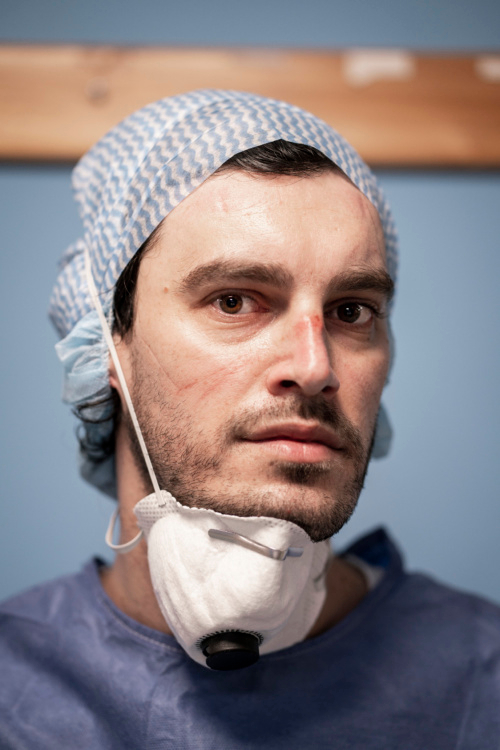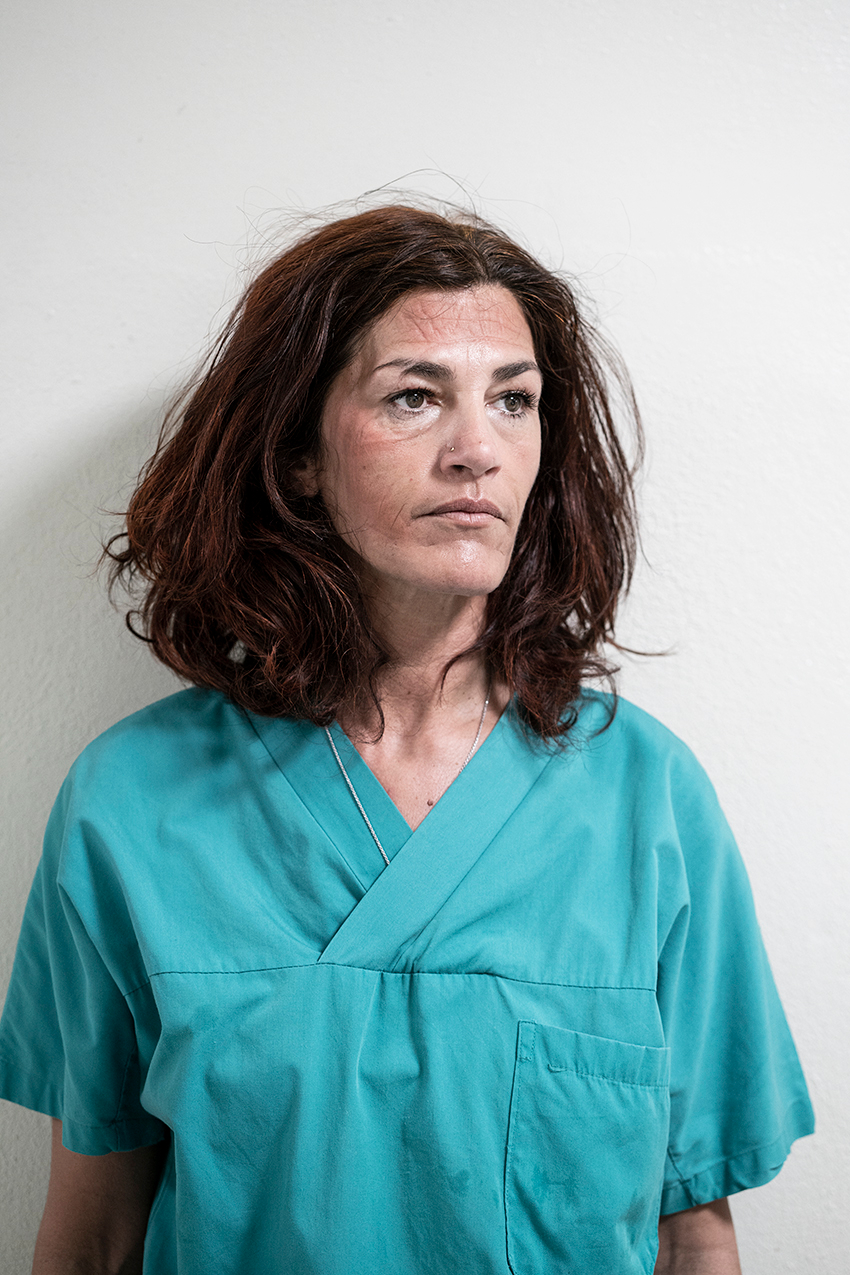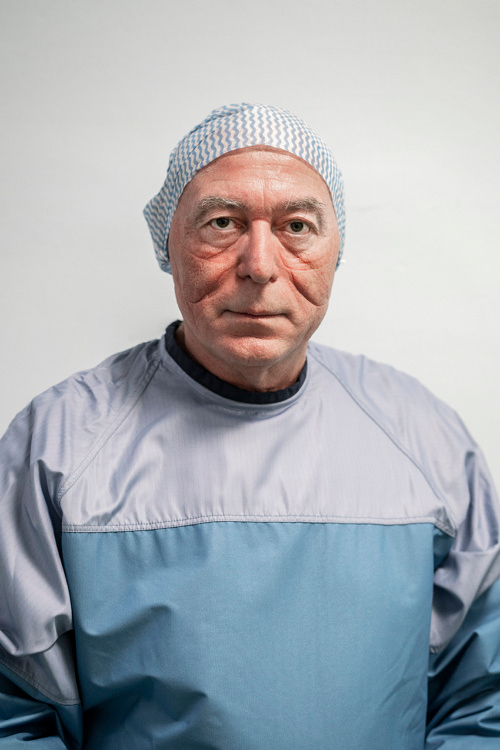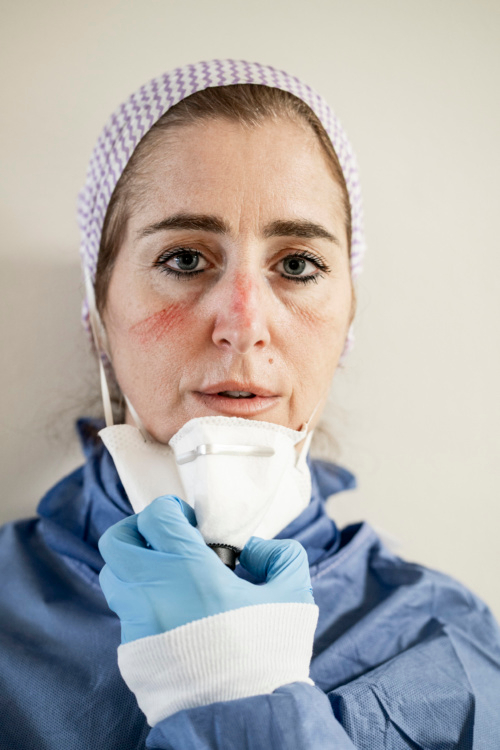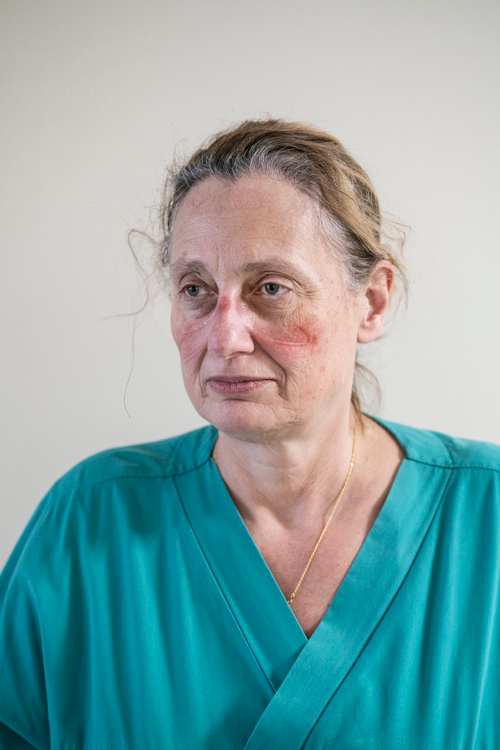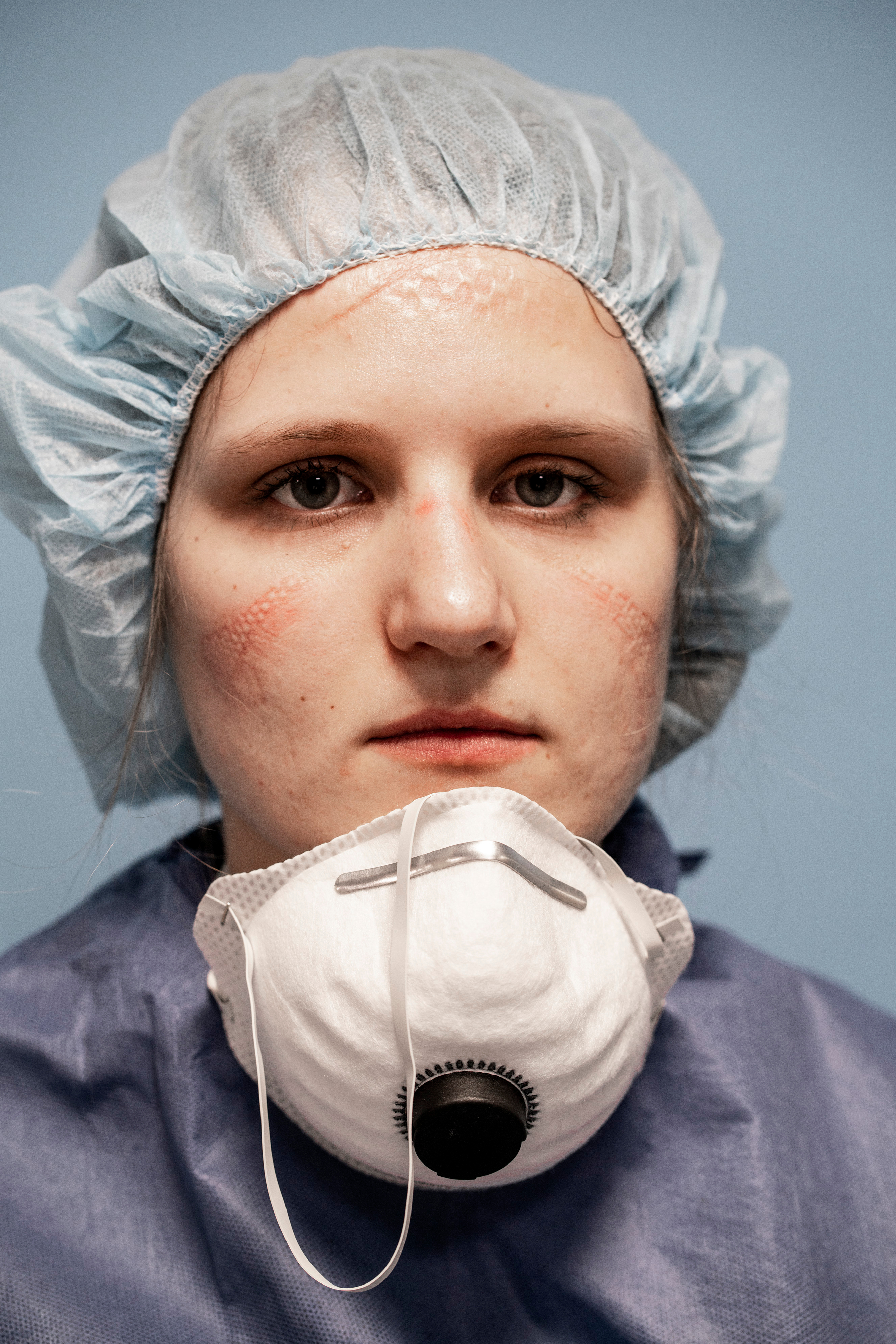
Alberto
Giuliani
San
Salvatore
It is never night within the Intensive Care Unit. There is no visible darkness or natural light, and now, while there is widespread fear, there is also no rest. The hospital is full of people; patients, doctors, nurses. But it is empty at the same time. Empty of sound, ideas, hopes; just emptiness—the emptiness of everything. I took these pictures in an attempt to go beyond a news story, to put a face to our collective fears.
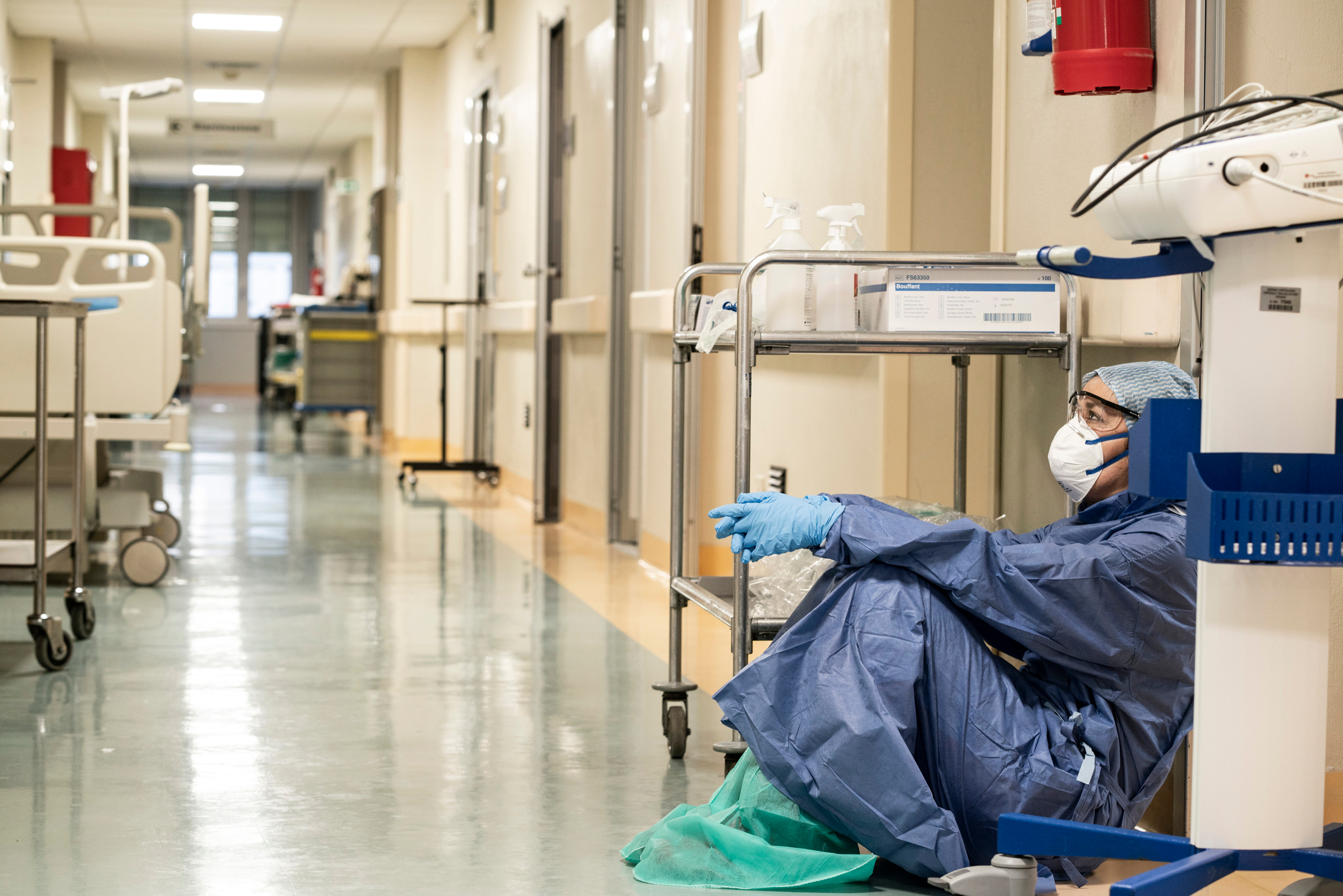
These are the doctors and nurses of the San Salvatore Hospital in Pesaro, Italy, the city of my birth and where I once again reside, which from day one has sadly been at the top of the COVID‑19 contagion and death charts. I photographed them at the end of their shifts—twelve hours without a break during their fight in an unequal war. In the quiet moments in front of my camera, these embattled individuals are in a state of total abandon, victims of an exhaustion that eats away at the body and the mind, a breathlessness that renders one disoriented, detached from time and space. They would take off their masks, caps, and gloves in front of my lens, remaining motionless, looking for some sort of normalcy amid the hell they were living.
In the deep imprints left by their protective masks, I found a symbol of their sacrifice, but above all, I found evidence of the pain and helplessness of standing before an unknown enemy. If the marks left behind are the only trace, they speak volumes about the threat—that the enemy is invisible. When we are finally out of this, it will be in large part due to the women and men working in hospital wards all over the world, battling this devastating tide, rekindling hope, and alleviating the loneliness of the ailing, even if a simple gesture of kindness is the only remaining response.
Giulio Mensi
Anaesthesiologist
The first dominating feeling is the lack of perspective; around us lives stop with an unnatural frequency, and behind those meager personal and anamnestic notes, we know that there are grandparents, fathers, mothers, friends, lovers, affections. And so, it is better that we do not think too much, even at the cost of training that cynicism that we didn’t even think we had. However, a chest x-ray that is slightly less white than the previous one, a patient for whom drugs can be reduced, is enough to break our despair and return us to seeing life. In those moments we look at each other, proud and moved. We must think about life carrying on, even when facing the pain of the many whose are lives are ending.
Annalisa Silvestri
Anaesthesiologist
I’m afraid, like anyone. But I don’t want this feeling to win, because death within is worse than that of the body. So, I struggle and I don’t even feel tired anymore, because at this moment my job makes sense more than ever. I am always in my ward in my thoughts, close to my patients. Day and night. I ask myself what I can do, or how I can do it better.
Before I put them to sleep and intubate them, I have them make a phone call to a relative. A greeting, to tell each other that all will go well. But it’s not so. And so it happens that the relatives, in tears, ask us to be close to their family member, to caress them, and to tell them—even if they cannot hear us—that they loved them, that they will miss them. This is the final greeting, which we bring every day.
Cinzia Buttiglione
Intensive Care Unit Nurse
It was shocking to come into my ward and see it completely overturned. Everyday things disappeared, replaced by an expanse of beds and intubated patients. It seems like a nightmare that comes back every day and keeps me awake every night.
My colleagues and I are tired, exhausted, worn out by the workload and protective equipment we wear. We do our best, but it’s not enough. We see people die in total solitude, without the comfort of any family members. It is something that should never happen, instead in this story, it’s what always happens. We fight together with each patient, but too often we are both defeated.
Francesca Palumbo
Intensive Care Unit Nurse
At the end of my shift I run away to lock myself in the house, hoping to leave everything outside the door. Instead, the suffering faces of my patients are there to stare at me, the voices of their relatives resonate in my head. I knew I had chosen a job that throws pain at you, but I was not prepared for this, for an illness that devastates the heart more than the face. I think back at the hands of the patients who, while I intubate them, squeeze mine. They seek courage in order to face the fear. Without them knowing just how much courage I find in their gesture. I grit my teeth; I look at my colleagues. And I tell myself that everything will be fine, because I am strong.
Martina Turiani
Intensive Care Unit Nurse
We feel suffocated under those masks, which we wear throughout the entire shift, without breaks. Without drinking so as not to have to go to the bathroom. But we hang in there. We made a promise to many patients before putting them to sleep to intubate them: that we would heal them, that we would take care of them, that we would wake them up and that we would make them go home to their families. Because many of them are fathers, grandfathers, husbands. Those frightened eyes stay in your mind and are the driving force that makes us fight at every turn. We will never stop.
Vincenzo Siciliano
Intensive Care Unit Nurse
I have always worked in emergency departments, against SARS, H1N1, and receiving victims of radiation. But nothing compares to what I’m experiencing these days. This virus seems invincible. It advances silently, sowing fear and death, without any effort. It’s an unequal war. We are collapsing and it, relentless, continues to terrorize the gaze of its victims, to cut their breath until it suffocates them. It is a perfect weapon, and it has already won its war, by the mere fact that it exists.
Federico Paolin
Intensive Care Doctor and Anaesthesiologist
In this historical period, during which all certainty disappears, I am moved by the unity and loyalty amongst colleagues, the closeness of the population, and the unconditional commitment of everyone to find a solution to this tragic situation. We doctors are not heroes, as we often hear ourselves being referred to these days. But we would like for some of today’s gratitude to remain over time. Because our dedication to your health hasn’t changed, and it won’t change.
The thing that frightens me most is the possibility that people that are dear to me might get sick. It makes me feel helpless not being able to take care of my parents, or not being able to be close to them in times of need. On working days, emotional fatigue adds itself to physical fatigue. And the words of support spoken to the many families who count on us clash with the awareness of the limits of medicine.
For many years, photographer and journalist Alberto Giuliani has explored scientific innovations and the efforts underway across the globe to safeguard ecological and societal longevity–from biospheres to cloning, cryopreservation, and genetic experimentation. In light of current measures to reduce the spread of COVID-19, the public installation at Brookfield Place of images from Giuliani’s series Surviving Humanity (2017–18), planned for CONTACT 2020, has been rescheduled for the 2021 Festival. Underscoring the urgency of environmental and collective action, the images in this series embody the many questions about the future that have motivated Giuliani’s journeys, including the one asked by his children: “How will the world be when we grow up?” Unexpectedly, the portraits he has captured at San Salvatore Hospital evoke a disconcerting answer, and mark the beginning of a new long-term project investigating the invisibility of contemporary enemies, the spread of fear, and the resilience of humankind. They also speak to the same vital ambition that Giuliani ascribed to the subjects of Surviving Humanity: “to pursue a way to overcome the current course of events, so that we might continue our shared existence.” – Bonnie Rubenstein
Co-presented with the Istituto Italiano di Cultura, Toronto
